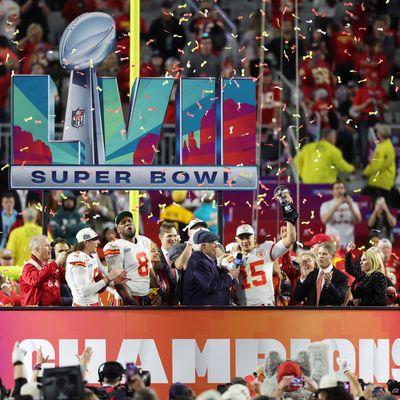
The NFL, for all its controversy, for all its cultural ubiquity, for all its violence, is a meticulously orderly organization. Even when the league is under fire for one thing or another — which it always is — it never feels as if anything is in danger of careening into chaos. The league is too powerful, too efficient, not to be firmly in control of all things.
This is particularly true at the Super Bowl, the one game still watched by people who don’t care about football, by people who even loathe football. Every story line gets streamlined at the Super Bowl with all the complexity sanded off and turned into “Everything is fine, just enjoy the game” propaganda. Damar Hamlin, whose on-field heart attack in week 16 led to some viewers (briefly) questioning whether they could ever watch a football game again, sat next to commissioner Roger Goodell in a skybox and became a feel-good story the NFL absolutely 100 percent did not deserve. The ongoing lawsuit filed by Brian Flores that claims racial discrimination in head-coach hiring was displaced by the inspiring tale of the first Super Bowl with two Black starting quarterbacks (a fact the NFL was patting itself on the back about all week but which, in a just universe, would evoke great shame) and “End Racism” painted in the end zone (next to, uh, the name “Chiefs”). The disgusting way the United States government and the NFL treated the family of slain player turned soldier Pat Tillman became yet another pro-military moment in a mutually beneficial partnership that has lasted for decades. The Super Bowl is a live sporting event, and that comes with built-in unpredictability. But everything other than the game is as stage-managed as an Apple product-release presentation.
Which is why, as infuriating as the ending of Super Bowl LVII was, it also felt a little like just desserts. The Kansas City Chiefs ended up beating the Philadelphia Eagles 38-35 on Sunday night with a drama-free field goal from Harrison Butker in the waning seconds of the game. This followed an incredible offensive performance from already Hall of Famer Patrick Mahomes, who overcame a high-ankle sprain to play an almost perfect second half against the best defense in football, including a fourth-quarter sprint that should have been the play this game would be remembered for. Instead, a different, far less glorious moment will mark this Super Bowl.
You saw the play and the call:
One could conceivably make the argument that this was the correct call from referee Carl Cheffers. The Eagles player, James Bradberry, had his hand on the back of Chiefs receiver JuJu Smith-Schuster and may have even closed his first in a “hold” motion. If that call came in the second quarter of a random regular-season Cardinals-Titans game, you’d hear the fan base of the team the call went against grouse for a moment, probably boo before the next snap — “Cheap call, refs” — and then forget about it.
But Cheffer’s call came on the third down of a tie game in the closing minutes of the Super Bowl, a Super Bowl that, with the wild crowd, Rhianna’s excellent halftime performance, and the two QBs’ heroics, was beginning to approach legendary status. If the call hadn’t been made — and no one would have even noticed if it hadn’t: You didn’t see the Chiefs receiver, or any of the Chiefs, protesting before the (late) flag was thrown — we would have never thought about it. The Chiefs would have kicked a field goal, and the Eagles would have driven down the field in the closing moments to try to tie or win it, and this face melter of a Super Bowl might have included an ending for the ages.
That is not what happened.
The flag was thrown. Eagles fans scratched their eyeballs out. The Chiefs then ran down the clock, which included purposely not trying to score a touchdown in the final seconds of a Super Bowl, which feels against the natural order of the universe — and kicked an easy, dull field goal, and then this game was just … over. There was no drama. There was no conclusion. There was just a slow, sad letting of air out of a balloon, a flaccid gasp of an ending. And everyone, including LeBron James, was unsatisfied.
The question of whether a referee should throw a flag in a moment like that is interesting philosophically. On one hand, he’s not there to judge the gravitas of a particular moment, to suss out its drama, to worry about whether the NFL is putting on a maximally efficient show. The referee is there to call the game, period. He saw a hold on the play, and he called it. (And Bradberry admitted to the holding afterward.)
On the other hand … oh, for fuck’s sake, man.
The NFL had a perfect story for its perfect night. But its maddening, erratic, “entertaining precisely because it’s so unpredictable” game got in the way. If the NFL had been in control on field the way it is off field, it would have zapped the ref right before he threw the flag, giving everyone the epic finale we were expecting and desperately hoping for. (They may zap him postgame anyway.) Instead, the ref — and, really, the game of football itself — blew the whole thing up. It’s endlessly frustrating. We’ll talk about it forever. We’ll yell at the NFL every time it shows up in highlights. But this is how it works. This is what sports are. Sometimes sports are glorious; sometimes we get our storybook ending. And sometimes sports cut us off at the knees at the worst, stupidest possible time. The NFL got something unforgettable on its Super Bowl Sunday, something it won’t be able to sand away. It was an incredible game; congratulations to the Chiefs. But also: For fuck’s sake, man.






























